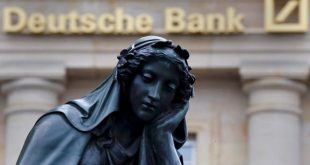On Wired, Andy Greenberger discusses Monero, Dash, and Zcash, krypto currencies that provide more privacy than bitcoin and its derivatives. Unlike commercial services like PayPal, Bitcoin allows anyone to spend money online without providing identifying details. But if someone’s Bitcoin address is linked with their real identity, any transaction from that address is entirely visible on the public blockchain … Hiding those transactions requires taking extra steps, like routing bitcoins...
Read More »Jewish Trust Sues Deutsche Bank For $3 Billion
Just when it seemed that no more lawsuits are possible for Germany's largest lender, which over the past two years has settled or otherwise paid billions to set aside a barrage of allegations of wrongdoing leading to the bank's suspension of bonuses for most senior bankers, today we learn that Deutsche Bank was sued by a Jewish charitable trust in Florida, alleging that the bank wrongly withheld as much as $3 billion from the heirs to a wealthy German family. According to Bloomberg, the...
Read More »How Does the Blockchain Transform Central Banking?
The blockchain technology opens up new possibilities for financial market participants. It allows to get rid of middle men and thus, to save cost, speed up clearing and settlement (possibly lowering capital requirements), protect privacy, avoid operational risks and improve the bargaining position of customers. Internet based technologies have rendered it cheap to collect information and to network. This lies at the foundation of business models in the “sharing economy.” It also lets...
Read More »Banking on the Blockchain
In the NZZ, Axel Lehmann offers his views on the prospects of blockchain technologies in banking. Lehmann is Group Chief Operating Officer of UBS Group AG. New possibilities: Higher efficiency; lower cost; more robustness and simpler processes; real-time clearing; no need for intermediaries; information exchange without risk of interference automated “smart contracts;” automated wealth management; more control over transactions; better data protection; improved possibilities for macro...
Read More »The Panama Papers
Key figures from The Panama Papers.
Read More »Blockchains in Banking (Commercial and Central)
The Economist reports about initiatives by commercial and central banks that aim at adopting the blockchain technology. For commercial banks, distributed ledgers promise various advantages—but they also cause problems: Instead of having to keep track of their assets in separate databases, as financial firms do now, they can share just one. Trades can be settled almost instantly, without the need for lots of intermediaries. As a result, less capital is tied up during a transaction, reducing...
Read More » Swiss Economicblogs.org
Swiss Economicblogs.org

